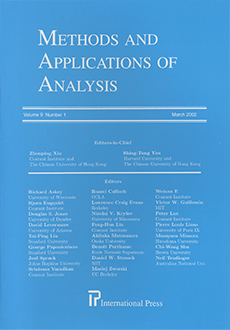Abstract
The approximate solution of optimization and control problems for systems governed by linear, elliptic partial differential equations is considered. Such problems are most often solved using methods based on the application of the Lagrange multiplier rule followed by discretization through, e.g., a Galerkin finite element method. As an alternative, we show how least-squares finite element methods can be used for this purpose. Penalty-based formulations, another approach widely used in other settings, have not enjoyed the same level of popularity in the partial differential equation case perhaps because naively defined penalty-based methods can have practical deficiencies. We use methodologies associated with modern least-squares finite element methods to develop and analyze practical penalty methods for the approximate solution of optimization problems for systems governed by linear, elliptic partial differential equations. We develop an abstract theory for such problems; along the way, we introduce several methods based on least-squares notions, and compare and constrast their properties.
Citation
Pavel B. Bochev. Max D. Gunzburger. "On Least-Squares Variational Principles for the Discretization of Optimization and Control Problems." Methods Appl. Anal. 12 (4) 395 - 426, December 2005.
Information





